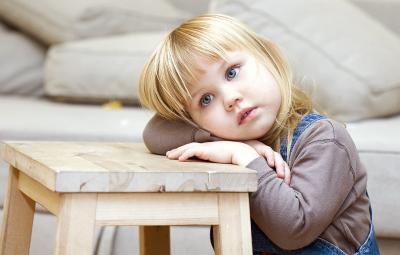Postpartum depression doesn't only impact moms; dads and older children can also become depressed when a new baby comes home.
Bringing a new baby home is a life-changing experience. We know mothers may feel blue after giving birth, but there's new light being shed on how postpartum depression (PPD) impacts the entire family—from dads to older children.
According to Margaret Hannah, executive director of the Freedman Center at the Massachusetts School of Professional Psychology: "Postpartum depression affects dads, families, children's development, as all depression does. If a mom or dad is depressed, it impacts a child's development."
Signs of Depression
When you're a mom suffering from PPD, it can be difficult to pull yourself out of your own depression to notice whether the rest of your family is down too, but it's important you do. According to the Anxiety and Depression Association of America (ADAA), children with parents who have depression are at a greater risk for becoming depressed themselves. The ADAA says if symptoms in children last for only a short period, it's not depression, just the blues. But when the symptoms last for more than two weeks and start to interfere with your child's daily life, then it may be time to consult a professional. Children with depression may show these symptoms:
1. Sad or irritable mood
2. Frequent crying
3. Withdrawing from activities and not wanting to be around friends
4. Loss of energy and change in eating habits
First Steps
Families may be afraid to admit they're having difficulty because it can be stigmatizing. Hannah says families need to feel supported and understand that "becoming a parent is a normative life crisis, underscore of crisis." Having postpartum depression as a parent or having a child who exhibits signs of depression doesn't equate to being a bad parent.
If you or someone in your family is dealing with depression, reach out to your healthcare provider or children's pediatrician. If you or your child is showing mild signs of depression, your healthcare provider may be able to list resources that are available close to your home, such as support groups or even organizations you can join to help you and your child feel engaged in your community. For example, the Freedman Center in Massachusetts and Postpartum Support International provide services ranging from free postpartum support groups for men and women to infant classes. If you notice your older children are struggling in school, you may want to reach out to their teachers or guidance counselors for extra support.
If your or your child is showing more severe signs of depression, the U.S. Food and Drug Administration says the first step is to get professional help and a professional diagnosis. If depression is identified, the FDA suggests deciding on a treatment course. The specific treatment for your family depends on the severity of the depression and the impact it's having on your family's daily life. Remember, you're not alone and depression is treatable.
tags : postpartum depression (PPD) , Frequent crying , you're not alone and depression








